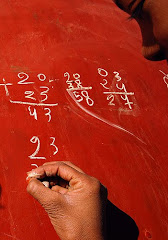Scott( sorry for name mix up), you certainly had an interesting chapter to deal with. The findings that you presented helped bring together issues raised by the previous two chapters. You did a good job of highlighting the statistics in this chapter and helping me make sense of what Boaler found. Great Job, enjoyed it a lot!
As I said above, I found this chapter so very interesting. The fundamental differences between AH and PP that were exposed by Boaler certainly helped delineate what is good and what is not in mathematics education. It was helpful to me as a questioner of " what does this looks like?"(inquiry based learning, as was raised by Terri-Lynn last Thursday. Boaler's activities were designed to "require students to combine and use different areas of mathematics together", and the activities did. Students were not always successful in completing these activities and consequently showed they couldn't combine math areas because the understanding of those areas and their connections to one another had not been made/learned.
When students made 'nonsensical answers' such as a roof's angle being 200 degrees. They demonstrated what I call 'non-attending thinking'. It is obvious in this book and my own experience that students usually do not stop to ask ... does my answer make sense? More than that though they don't have that inner circuitry, that instinctual sense about math that would even cause them to pause or to think they need ask questions. Questions don't pop up because in their minds, math is not about thinking it is about doing.
Another point of interest for me were the differences in the results for year 9 students compared to year 8. There has to be a connection between the improvement and the length of time the students at PP had been involved in this kind of learning. Prior to year 8 their experiences in mathematics classrooms were essentially the same as the students in Amber Hill. More proof, to my mind at least, that inquiry or project-based learning works!
As I stated in class, although perhaps not very coherently, I have some concerns about Phoenix Parks approach. I want to make it clear that I think Phoenix Parks methods to be far superior to Amber Hills. My concern is not about the curriculum and teaching methods. It is regarding the loopholes I see in the programs structure or framework. Specifically, I am speaking about the lack of teacher redirection when students are completely off task and with the lack of organization of student written work. I am questioning whether or it would be beneficial to have some standard for student attending to tasks in order to promote their involvement with the mathematics at hand. Further to that thought, I wonder if the PP teachers can even determine if there are areas of content that have not been covered at all. I do understand the need to build an atmosphere of openness and trust so that students will continue to explore, inquire, question, and contend with the solution to a problem. As for organization of written record of work, its as Dr. Stordy pointed the other night,assessment is not just about what the students put down on paper. Still I wonder how one could sort through the mess of papers to find out what the students recorded and what if anything the written record says about that students needs. I'm sure the answers to some of this will become clearer as we progress through the book. Obviously something informs the project formation by teachers, it is possible my questions come from my limited experience with these methods and that these concerns are really not valid at all. We'll see!
Video Links Have Been Moved!
Subscribe to:
Post Comments (Atom)


No comments:
Post a Comment